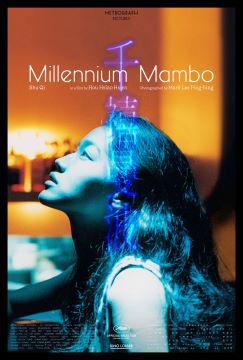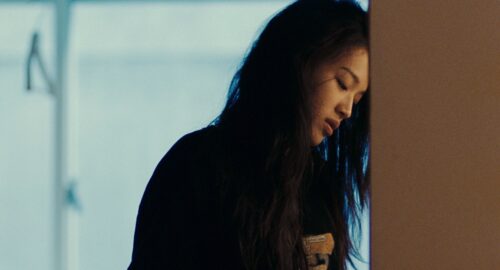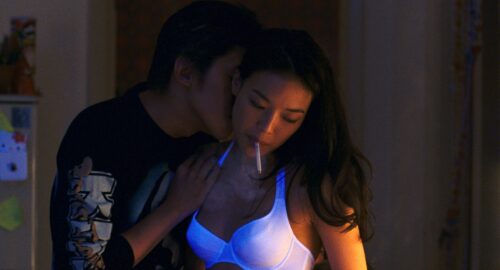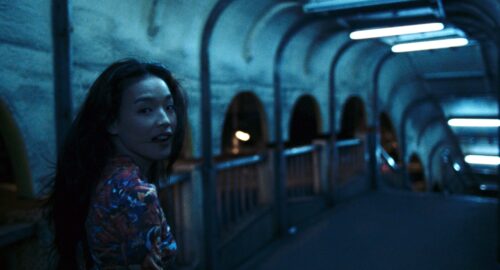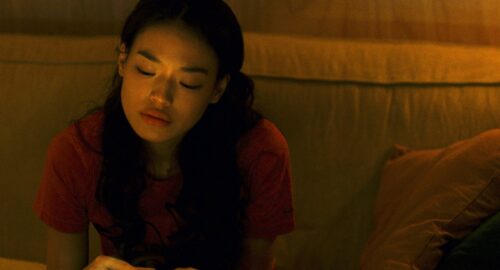IN THE MOOD FOR LOVE
MEETS REQUIEM FOR A DREAM
Hou Hsiao-Hsien, a veteran new-wave filmmaker from Taiwan, has captured the idiosyncrasies of the small island nation for over two decades. In this 4K restoration of his seminal film, Millennium Mambo (åƒç¦§æ›¼æ³¢), Hou’s turn-of-the-century (2001) pessimistic take on the future of Taiwanese youths comes alive once again.
Millennium Mambo is a slow burn. This highly auteur-stylized film has long single-camera takes, creating a numbing world filled with cigarette smoke, drugs, and neon colors. Vicky (Shu Qi) is our resigned protagonist, whose life is unveiled in dream-like flashbacks. Her deadbeat boyfriend, Hao-hao (Tuan Chun-hao), occupies much of her memory, hovering between abusive and pitiable. There is no one to root for here. Forget about redemption, life-changing ideas, or any form of a breakout moment. Instead, the picture floats through the world, hanging by a thread, guided by lust, need, and survival.
Watching the film and thinking about the film are two drastically contrasting experiences. Seeing Vicky get scrutinized by her jealous, rage-filled boyfriend is painful. It is hard to decide which character is more pathetic and deserving of our pity. Not that it matters that much, but neither protagonist has neither shown any capacity for change nor accepts responsibility for their own misery. Occasional moments of joy give a much-needed break from the monotonous tone. A face dunking into freshly fallen snow is viscerally felt. And Jack (Jack Kao), the mobster boss who cooks and cares for Vicky, adds a contrasting element of gentleness and humanism, even as Jack’s character sets up the melancholy finale.
The beautiful, almost heartbreaking film as an object on which to ponder and reflect. Mark Lee Ping-bing’s cinematography is absolutely stunning. The hues are incredibly vivid under the neon lights. Sometimes, the world of screenwriter Chu Tien-wen is presented almost like a documentary about a deep sea abyss filled with grotesque creatures glowing in bioluminescent neon colors. The riveting sound design of Tu Duu-Chih and Kuo Li-chi is absolutely stunning. Overblown capture sounds of the fight scenes and mixing between voice and club music are so masterfully done.
The time-jumping order of the narrative confuses, yet the way the film ends in the middle of the memory collections perfectly captures the trapped state of our heroine. Vicky returns to being the same lost soul, at the prime of her youth and beauty but unable to harness any of her power to its full potential. As Hsiao-Hsien said, “Young girls are like flowers; they fade immediately upon blooming — the process occurs in an instant.” This is a sobering movie, rich in culture, that I enjoyed much more in retrospect than while watching it. You may find yourself having to revisit the film. It will be there, just like that deadbeat boyfriend of Vicky.
stills courtesy of Kino Lorber
Millennium Mambo (4K restoration)
2001 | Taiwan, France | 119 minutes | color
in Japanese and Mandarin, with English subtitles
plays Feb 1, American Cinematheque in L.A; Feb 2 at the Acropolis, L.A;
Feb 25 at the Metrograph, NYC
to screen online, visit Metrograph At Home.
